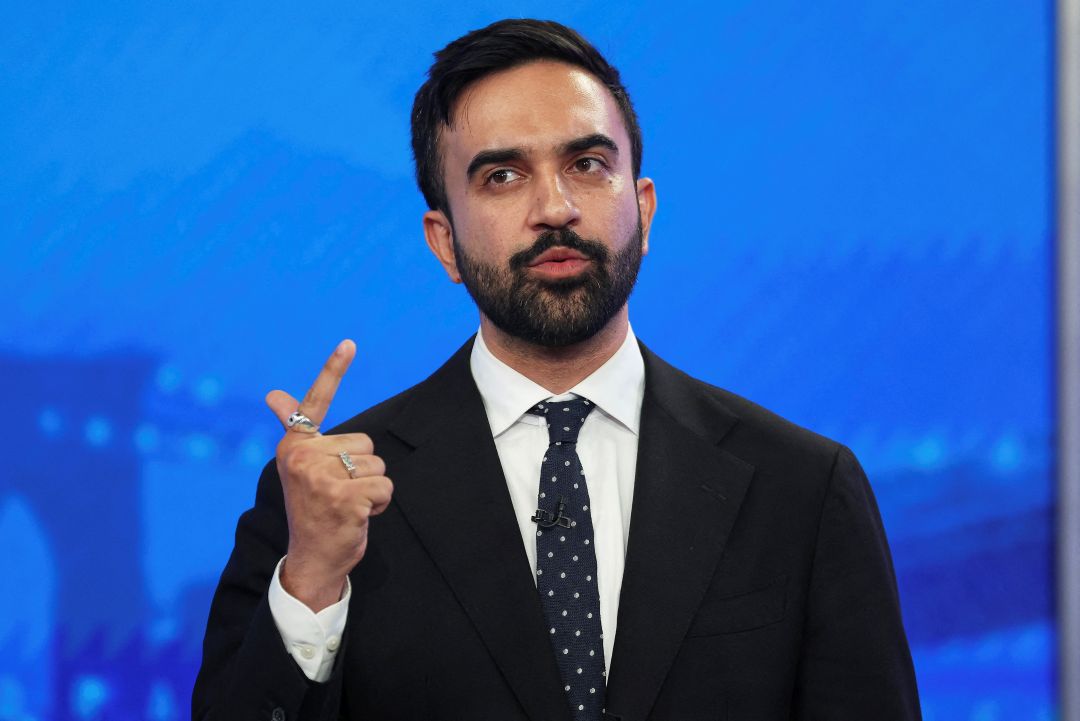A major political confrontation is rapidly taking shape in New York City as Mayor-elect Zohran Mamdani signals he will openly resist federal immigration enforcement under President Donald Trump. The incoming mayor’s rhetoric—and his early policy posture—set the stage for what could become the most consequential clash between a local government and the federal executive branch since the height of the sanctuary-city battles a decade earlier.
Mamdani, a 34-year-old democratic socialist and former state legislator, has not waited for his swearing-in to draw clear battle lines. Even before taking office, he has denounced federal immigration authorities, challenged their authority in New York City, and vowed to protect undocumented residents from what he describes as discriminatory and heavy-handed federal actions. His position places him on a direct collision course with the Trump administration, which has vowed to aggressively enforce removal orders and crack down on sanctuary jurisdictions.
A Viral Arrest Sparks New Tensions
The immediate spark for the latest flare-up came after City Councilman Shaun Abreu posted video of Homeland Security officers detaining a migrant in Washington Heights. Abreu called the incident “deeply disturbing” and accused federal agents of targeting people without transparency or due process.
His criticism, however, collided with the facts: court records show the man detained, Alpha Amadou Diallo, had already undergone immigration proceedings. Diallo entered the United States illegally in 2021 and was later ordered removed by a Biden-era immigration judge—directly contradicting Abreu’s framing.
The revelation undercut the narrative that federal officers were conducting arbitrary arrests and suggested the encounter was a lawful enforcement action carried out under longstanding procedures.
Still, the moment reignited local-federal tensions and gave Mamdani an opportunity to reiterate his own stance: unequivocal opposition to federal deportation operations.
Mamdani: “You Will Have to Get Through Me”
Throughout his campaign, Mamdani made immigration a defining issue. He repeatedly condemned ICE, calling it a “rogue agency,” and pledged to block federal removal efforts—an extraordinary promise for a municipal executive with no formal jurisdiction over federal law enforcement.
His message during the campaign was blunt:
“If you want to pursue your promise to create the single largest deportation force in American history, you will have to get through me to do that here in New York City.”
Mamdani’s statements signal not just disagreement with federal policy, but outright defiance. His rhetoric echoes earlier sanctuary-city leadership, but it goes further—intentionally provoking a direct confrontation.
The Trump administration’s immigration advisers have already warned that New York City will not be treated as a special case. Border czar Tom Homan previously promised ICE would “flood the zone” in the city following renewed federal directives.
If both sides maintain their current posture, a collision seems almost inevitable.
A Message to ICE: “Everyone Will Be Held to the Law”
Shortly after his election, Mamdani was asked whether he had a message for federal immigration authorities.
He answered without hesitation:
“My message to ICE agents, and to everyone across this city, is that everyone will be held to the same standard of the law. If you violate the law, you must be held accountable.”
The implication was clear: Mamdani believes federal officers may themselves violate laws or civil rights, and that his administration will intervene if he believes they overstep.
He continued:
“There’s a sense growing across this country that certain people are allowed to violate the law—whether that be the president or agents themselves. What New Yorkers want is an era of consistency, clarity, and conviction.”
This framing positions Mamdani not merely as a critic of federal policy, but as a defender of civil rights against what he views as abusive federal practices. It is a posture likely to resonate with progressive voters, yet it also guarantees aggressive pushback from federal officials.
A City Already Strained by Migrant Arrivals
New York City experienced a massive influx of migrants during the Biden administration, many arriving through the southern border before being transported north. The situation strained city resources, overwhelmed shelters, and triggered political battles among Democrats and Republicans alike.
President Trump frequently criticized New York City’s sanctuary policies, arguing they encouraged illegal immigration and undermined national security. His administration has pledged to reverse those policies, enforce removal orders more aggressively, and pressure city governments to cooperate.
Mamdani, by contrast, has embraced a philosophy of resistance—framing the city not as a participant in enforcement but as a bulwark against it.
This stark divide ensures both sides will test the limits of their authority.
A Controversial Advisor Raises New Questions
Mamdani’s personnel decisions are also drawing scrutiny. One of his earliest and most influential appointments is Elle Bisgaard-Church, a longtime adviser and the reported “chief architect” behind his proposal to deploy social workers instead of police for certain non-violent emergency calls.
Bisgaard-Church, an Ivy League-educated political newcomer affiliated with the Democratic Socialists of America, is known for her highly critical views of policing. Her philosophy aligns closely with the “defund” movement that surged in 2020. She is now expected to hold significant authority within Mamdani’s administration.
Her most high-profile contribution to date is the development of the proposed Department of Community Safety, which would divert non–life-threatening 911 calls—particularly those in subway stations—away from law enforcement and toward mental-health professionals.
The proposal is costly, with estimates reaching $1.1 billion, and is deeply controversial. Supporters argue it modernizes public safety, while critics say it risks weakening already strained policing resources at a time when the city faces serious security concerns.
Fox News reported that Bisgaard-Church consulted with mental health practitioners, public safety experts from other cities, and former NYPD Chief Rodney Harrison while crafting the plan.
Still, the political undercurrents are unmistakable: Mamdani is building an administration that seeks to fundamentally reshape the city’s approach to law enforcement, public safety, and immigration.
A New Era of Sanctuary Politics
Where previous New York City leaders attempted to walk a line between cooperation and resistance, Mamdani appears prepared to openly challenge the federal government.
Sanctuary-city policies under earlier administrations mostly centered on limiting information-sharing with ICE or refusing to honor certain detainers. Mamdani’s rhetoric hints at something far more aggressive:
-
possible legal challenges
-
potential arrests of federal agents if he believes they break state or local laws
-
refusal to grant federal officers access to certain city facilities
-
expanded protections for undocumented residents
-
using city resources to obstruct deportation operations
Although he hasn’t detailed his strategy, the statements he has made suggest a willingness to confront the federal government in ways few municipal leaders have attempted.
If implemented, his policies could trigger constitutional showdowns involving preemption, law-enforcement authority, and federal supremacy.
Federal Response: “We Will Enforce the Law”
The Trump administration has not directly responded to Mamdani’s latest comments, but top officials have left little doubt about their intentions. Trump advisers say New York City will not receive exceptions or exemptions and that enforcement operations will continue nationwide—including in jurisdictions where local officials refuse cooperation.
The Biden judge’s removal order in the Diallo case gives federal officers firm legal footing, complicating Mamdani’s claim that arrests lack due process.
Should Mamdani attempt to obstruct federal operations, it is likely the Justice Department will intervene.
A High-Stakes Standoff With National Implications
The looming battle between New York City and the Trump administration is about far more than one policy dispute. It touches on the core questions of federalism:
-
Can a city meaningfully resist federal immigration law?
-
What limits exist on federal enforcement?
-
How far can a local executive go in protecting undocumented residents?
-
What happens when interpretations of “the law” differ sharply across levels of government?
The answers could shape national immigration policy for years to come.

James Jenkins is a celebrated Pulitzer Prize-winning author whose work has reshaped the way readers think about social justice and human rights in America. Raised in Atlanta, Georgia, James grew up in a community that instilled in him both resilience and a strong sense of responsibility toward others. After studying political science and creative writing at Howard University, he worked as a journalist covering civil rights issues before dedicating himself fully to fiction. His novels are known for their sharp, empathetic portraits of marginalized communities and for weaving personal stories with broader political realities. Jenkins’s breakout novel, Shadows of Freedom, won national acclaim for its unflinching look at systemic inequality, while his more recent works explore themes of identity, resilience, and the fight for dignity in the face of oppression. Beyond his novels, James is an active public speaker, lecturing at universities and participating in nonprofit initiatives that support literacy and community empowerment. He believes that storytelling is a way to preserve history and inspire change. When not writing, James enjoys jazz music, mentoring young writers, and traveling with his family to explore cultures and stories around the world.









